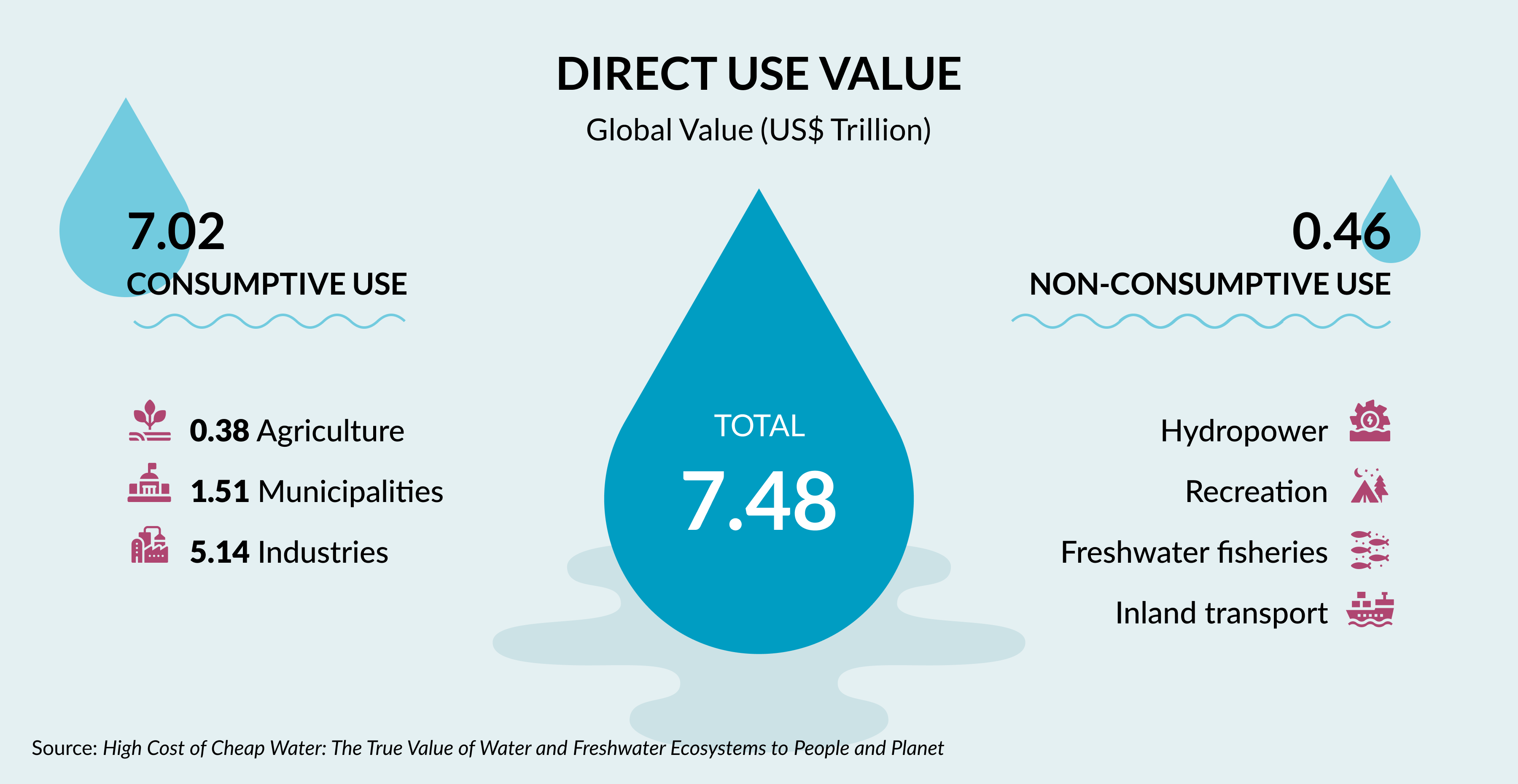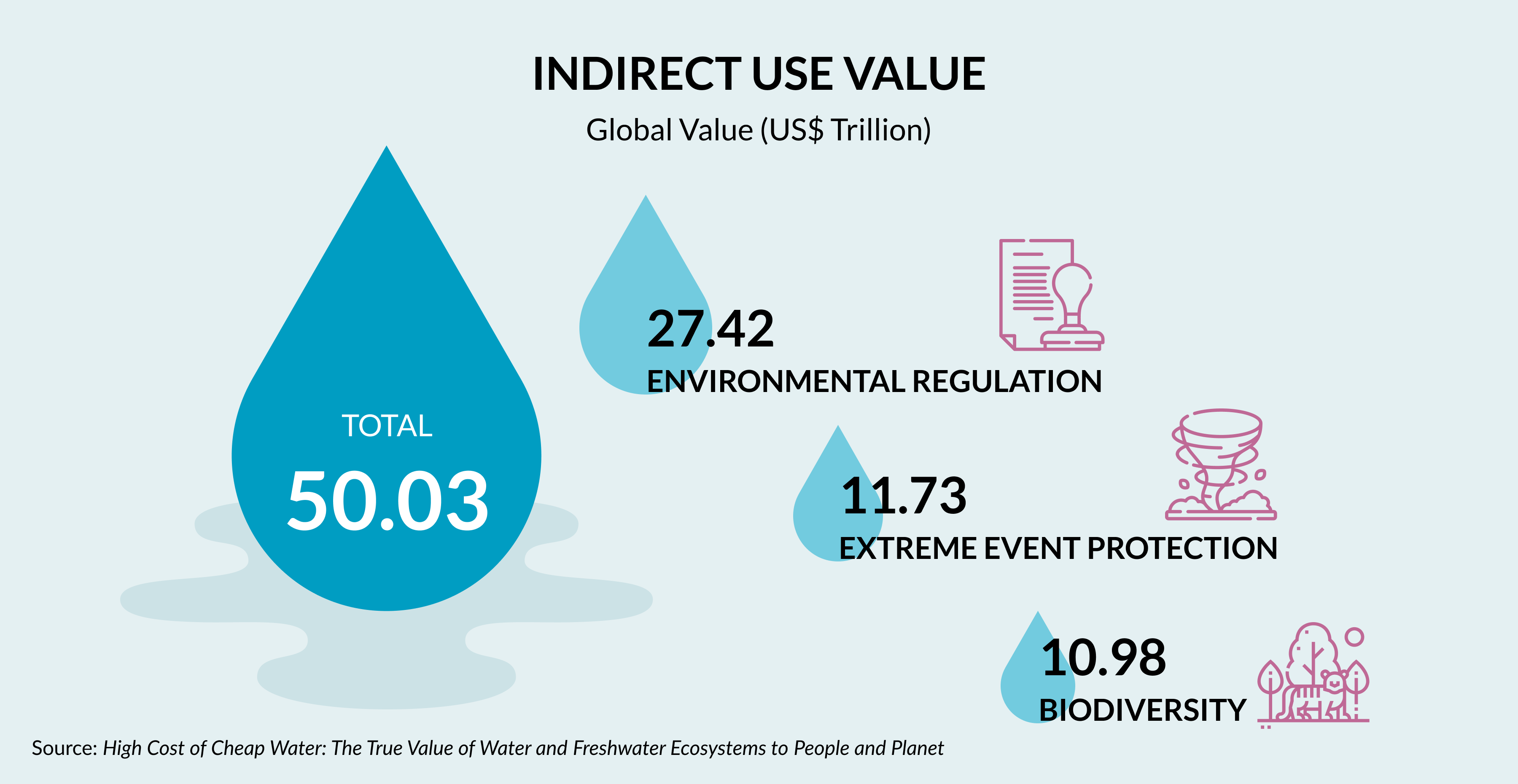Dalberg uses cookies and related technologies to improve the way the site functions. A cookie is a text file that is stored on your device. We use these text files for functionality such as to analyze our traffic or to personalize content. You can easily control how we use cookies on your device by adjusting the settings below, and you may also change those settings at any time by visiting our privacy policy page.
Appreciating the extensive benefits derived from water and freshwater ecosystems is of vital importance for decision-makers to make informed choices in water stewardship and management. Trade-offs between these values and their impact on land use, population growth, urbanization, and agriculture need to be carefully considered. Climate change introduces even more uncertainties, making a dynamic understanding of water’s value and the recognition of the critical importance of healthy freshwater ecosystems crucial for effective water management and stewardship. A new study conducted by Dalberg for World Wildlife Fund (WWF), articulates the value of water by demonstrating its uses and assigning an economic value against ecosystem services. Such quantification aims to draw attention to the urgent imperative to invest in healthy freshwater ecosystems, as highlighted in this video released by WWF:
According to economic valuation frameworks, the “use value” of water involves values derived from water through its direct or indirect use. “Direct use value” includes tangible benefits that humans derive from consuming or utilizing water that is stored and supplied by freshwater ecosystems for different purposes (e.g., water supply for household, industrial and agricultural purposes, recreation, freshwater fishing, hydropower generation). “Indirect use value” includes benefits that individuals and societies derive from using ecosystem services provided by rivers, lakes, wetlands, and aquifers (e.g., water purification, flood regulation, carbon sequestration, biodiversity conservation, cultural and spiritual value).
Direct Use Value: Tangible Benefits Derived from Water Consumption
Direct use of water, benefiting households, agriculture and industries, amounts to at least $7.5 trillion annually, constituting 12% of the total value (see Figure 1). Agriculture constitutes the largest use of water, representing approximately 70% of global water extraction. In 2021, the estimated value of water in irrigated agriculture was $380 billion. Industries and energy production also rely heavily on water, with the industrial use of water generating $5.1 trillion annually. Furthermore, water withdrawal for drinking water and sanitation is crucial. 
Indirect Use Value: Benefits Derived from Ecosystem Services
Indirect benefits from freshwater ecosystems, despite being seven times more valuable than direct water use, are frequently disregarded (see Figure 2). The economic value of these ecosystem services is estimated at $50 trillion annually. Regulatory benefits of freshwater ecosystems, such as nutrient deposition and natural water purification, contribute $27 trillion annually. Wetlands and peatlands, for example, have significant carbon sequestration capacities. Healthy freshwater ecosystems play a vital role in climate adaptation, disaster risk reduction, preserving genetic diversity, and sustaining migratory species. They safeguard against extreme climate events, ensuring economic and social stability. 
“Water Blindness” is Pervasive and Affects Policymaking
The failure to consider the multifaceted values of healthy rivers, lakes, wetlands, and aquifers when making decisions about water allocation, infrastructure, and development has already led to significant harm to freshwater ecosystems. Over one-third of wetlands have been lost since 1970, and only one-third of long rivers still flow freely. During the same period, freshwater species populations have plummeted by an average of 83%, a much steeper decline than that experienced by terrestrial or marine species. This persistent “water blindness” in policymaking continues to drive actions that harm these ecosystems, including dam construction, drainage, and dredging, despite the vast value they provide. To establish a safe boundary for the earth’s surface water, scientists recommend that in any given catchment area, less than 20% of the flow of rivers and streams should be disrupted or altered to protect biodiversity and ecosystem functionality. Regrettably, this target is only met for 66% of the world’s land area and less than 50% of the global population.
Mobilizing Action to Save Freshwater Ecosystems
Addressing the global freshwater crisis requires active participation from everyone, but substantial progress hinges on the immediate actions of critical stakeholders. It is imperative that key actors recognize the gravity of water-related risks and unite to fundamentally reshape the world’s perspectives on water and freshwater ecosystems:
- Decision-makers must integrate freshwater ecosystem goals into national policy plans, ensuring they influence policymaking across sectors. This includes endorsing initiatives like the Freshwater Challenge, aiming to restore 300,000 kilometers of degraded rivers and 350 million hectares of wetlands by 2030, while preserving intact ecosystems. Investing in nature-based solutions to address the water storage gap is essential, alongside ending detrimental subsidies and creating incentive structures for responsible water use, particularly in water-intensive sectors like agriculture.
- Companies should develop robust water stewardship strategies, particularly in water-intensive sectors, underpinned by science-based targets. They must assess and transparently disclose water risks, while actively cooperating to mitigate these risks in vital river basins. Companies should also advocate for government policies that support the sustainable restoration of water and freshwater ecosystems, fostering a holistic approach to water management.
- Civil society organizations should advocate for healthy freshwater ecosystems to enhance water, food, and energy security, and promote swift action. They must promote awareness on water scarcity by underscoring the pivotal role played by healthy freshwater ecosystems in enhancing human well-being, mitigating conflicts and natural disasters, and combating the loss of biodiversity and climate change through awareness campaigns. Establishing a global water movement that unites diverse groups, including indigenous peoples, local communities, women, youth, scientists, activists, and political, business, and financial leaders, is imperative.
In addition, recognizing that everyone has a role to play in addressing the water crisis, individuals can contribute through mindful consumption, support for freshwater initiatives, educating others, water stewardship advocacy, and efforts for change.
Urgent Action Imperative to Tackling Water, Nature, and Climate Crises
Climate change is poised to impact the world primarily through water, including altered precipitation patterns, river flows, and a rise in severe droughts, floods, and storms. The level of funding and investment in water, specifically in the protection and restoration of freshwater ecosystems, falls far short of what is needed.
- First, governments and development finance institutions should commit to dedicating 50% of public climate finance to adaptation initiatives, particularly focusing on the “restoration economy” and nature-based solutions.
- Second, the private sector can play a pivotal role in closing the funding gap. Financial institutions can identify promising investment opportunities that not only generate returns but also advance freshwater and climate adaptation.
- Finally, financial institutions need to invest in mitigating water-related financial risks. They can divest from high-impact projects, support ecosystem restoration, and require client companies to assess and disclose water-related risks in their operations and supply chains.
Across the globe, there is a growing recognition of the pressing need to address the water crisis. Communities, companies, and nations are confronting escalating challenges related to water quantity, quality, and the impact of climate change on water-related disasters and ecosystem degradation. Urgent action is required to preserve the diverse values of freshwater ecosystems and pave the way for a world that is both net-zero and nature-positive, characterized by equity and resilience. Local, national, and transboundary decision-makers, civil society, as well as leaders in business and finance who recognize the risks posed by freshwater degradation, and mobilize to fundamentally shift the way water and freshwater ecosystems are valued and invested in will be pivotal to mitigating the water crisis. Read the report here.

